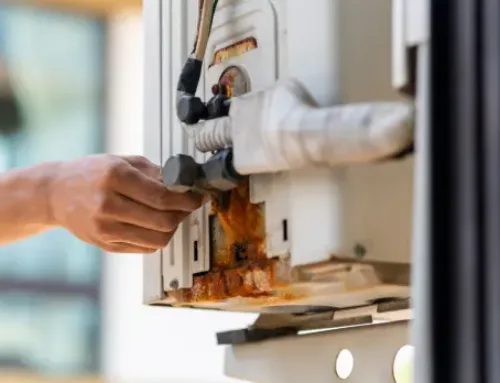Are you planning to buy a new furnace for your home but unsure which type is the best for you? You have reached the right place!
Furnaces are essential to maintain a comfortable temperature indoors during the chilly winter of Canada. This makes it very important to choose the right furnace for your home.
There are four types of furnaces: natural gas, electric, oil furnaces, and propane furnaces. Each type works differently and comes with its own set of pros and cons.
Understanding the difference between these furnace types can help you make an informed decision tailored to your house-specific needs.
In this guide, we will break down the characteristics of each furnace type to help you determine which furnace might be the best fit for you. Let us start by learning more about furnaces.
What Is a Furnace?
A furnace is an electrical appliance that generates heat to warm houses. It generally uses fuel like gas or oil to produce heat.
The heat is generated by burning the fuel, which warms the air inside the furnace. A fan then blows this heated air through ducts into rooms, providing warmth.
Furnaces are commonly found in most of the homes and are a central part of a heating system. They ensure indoor comfort during colder months.
Let us now understand various types of furnaces in detail.
Types of Furnaces
Basically, there are four types of furnaces available to install in your home. Each comes with its own benefits and drawbacks. Let us understand all the types of furnaces in detail.
1. Natural Gas Furnace
A natural gas furnace is a heating system that burns natural gas to produce heat for a house. It is a common way to warm homes efficiently and quickly.
This furnace ignites natural gas, heating air circulating through ducts to warm rooms. This type of furnace is cost-effective, as natural gas is often cheaper than other fossil fuels. Here are some pros and cons of natural gas furnaces.
Pros of Natural Gas Furnace
- Cost-effective compared to other fuel sources.
- Offers reliable and consistent heat.
- Generates fewer emissions compared to other fossil fuels.
Cons of Natural Gas Furnace
- Potential safety concerns because of gas leaks.
- Dependency on gas supply, susceptible to price fluctuations.
- Needs professional installation and maintenance, contributing to initial costs.
2. Oil Furnace
An oil furnace is a heating system that uses oil as its fuel source to produce heat. It ignites oil in a combustion chamber, which heats the air.
This heated air is circulated throughout the house via vents and ducts. The furnace typically contains a blower that helps distribute the heated air efficiently.
Regular furnace repair and maintenance, which includes cleaning and checking for malfunctions, is essential for this type of furnace.
This ensures the furnace works properly and safely. An oil furnace is commonly found in the region where natural gas is not readily available.
This makes it a reliable heating solution for many homeowners. Let us discuss a few pros and cons of oil furnaces.
Pros of Oil Furnace
- Efficient heating in cold climates.
- Reliable and long-lasting heating system.
- Produces high heat output.
Cons of Oil Furnace
- Reliant on oil prices.
- Needs a storage tank for oil and regular maintenance.
- Environmentally less clean compared to other types of furnaces.
3. Propane Furnace
A propane furnace is a heating system that uses propane gas as fuel to offer warmth in a home. It works by burning propane within a combustion chamber, creating heat. This heat is transferred to the air, circulating through the building via ductwork and vents.
Propane furnaces are commonly used in areas where natural gas is unavailable. This type of furnace is popular for efficiency and cost-effectiveness.
They are controlled by a thermostat, which allows people to set their preferred temperature for a comfortable living. Here are a few pros and cons of propane furnaces.
Pros of Propane Furnace
- Lower maintenance costs.
- Can be used off the grid.
- Environmental friendly burning.
Cons of Propane Furnace
- Initial installation costs can be high.
- Risks of carbon monoxide if not maintained properly.
- Combustion byproducts require proper ventilation.
4. Electric Furnace
An electric furnace is a heating system that uses electricity to generate heat.
It contains heating elements, generally made of coils, which produce heat when electricity passes through them. The warm air is circulated through the home by a blower or fan.
Electric furnaces are popular for their efficiency and ease of installation since they do not require a chimney or venting system.
They can be used in homes or buildings where natural gas or other fuel sources are not available. Let us explore some pros and cons of electric furnaces.
Pros of Electric Furnace
- Energy-efficient and cost-efficient to install.
- Easy to maintain and operate.
- Environmentally friendly, it does not produce carbon emissions.
Cons of Electric Furnace
- High long-term operating costs due to electricity prices.
- Might be less effective in extremely cold climates.
- Relies on electricity and is vulnerable to power outages.
Types of Furnaces Based on Operation
Furnaces can also be differentiated based on their operation. Here’s the infographic that describes the three different types of furnaces on the basis of their operation.
Now that we have discussed different types of furnaces let’s understand why it is essential to choose the right furnace for your home.
Why Is It Important To Choose the Right Furnace for Your Home?
Choosing the right furnace for your home is vital for various reasons.
First, the right furnace assures adequate heating in your living space. It also maintains a comfortable and cozy environment during colder months.
A well-sized furnace matched to the dimensions and requirements of your home can efficiently regulate the temperature.
This can also prevent issues such as insufficient heating or excessive energy consumption. This can save you money on energy bills in the long run and provide consistent warmth without overworking the system.
Moreover, selecting the right furnace contributes to the overall safety and well-being of your household.
A well-sized and maintained furnace reduces the risk of potential hazards such as carbon monoxide leaks or fire incidents. Furthermore, the right furnace can enhance air quality by effectively filtering out dust, allergens, and other pollutants.
It promotes a healthier atmosphere for you and your family. Making an informed decision in choosing a furnace tailored to your house’s requirements assures comfort, safety, and better air quality.
How To Choose the Best Furnace for Your Home?
Choosing the right furnace for your house is important for comfort and efficiency. Here are several factors to consider when selecting one for your home.
1. Size and Heating Capacity
When selecting a furnace for your house, it is important to consider two main factors: size and heating capacity.
If you choose a furnace that is very small, it will not provide sufficient heat to your home. On the other hand, if you choose a furnace that’s too big for your home, it will use high electricity unnecessarily and will lead to inefficient operation.
So it’s important to determine the appropriate size of the furnace and it depends on the square footage of your home, the insulation levels, and the climate in your area.
Choosing the furnace with the right heating capacity assures it can efficiently and effectively warm your house without overworking or underperforming.
This helps in maintaining a comfortable indoor temperature. Matching the size and heating capacity of the furnace to your house’s requirements is important for optimal heating performance and energy efficiency.
2. Energy Efficiency
Energy efficiency means how efficiently a furnace uses energy to function. A more efficient furnace will consume less energy while offering the same heat level.
It also reduces the energy bills. Look for the efficiency rating, which indicates the percentage of fuel the furnace converts into usable heat.
A higher efficiency rating or above 90% signifies better energy efficiency. This ensures you get more warmth for each unit of energy consumed. This also makes it an economical and environmentally friendly option.
3. Fuel Type
The fuel type is an important factor when selecting the right furnace for your house. Furnaces generally operate on various fuel sources such as natural gas, propane, oil, or electricity.
The choice of fuel type impacts the initial cost of the furnace and ongoing operational expenses. As we discussed above, natural gas and propane are more cost-effective but need access to the respective gas lines or tanks.
Electric furnaces may have higher operating costs but can be more accessible in areas without gas infrastructure. Understanding available fuel options and their associated costs is essential in choosing a furnace that best suits your needs and budget.
4. Features and Technology
You should also prioritize the features and technology when choosing the right furnace for your home.
Features like variable-speed blowers, programmable thermostats, and zoning systems affect the furnace’s efficiency and comfort level in your house.
Advanced technology, like high-efficiency models with smart sensors and modulating burners, can significantly impact energy savings.
Consider the type of filtration systems, noise levels, and ease of maintenance. These features directly influence the overall performance and convenience of the furnace in your household.
By assessing these aspects, you can make an informed choice that aligns with your heating needs and energy-savings goals.
5. Reliability and Brand Reputation
Reliability and brand reputation are important factors when selecting the furnace. Reliability means how consistently a furnace performs without breakdowns or malfunctions.
This ensures it functions smoothly over time. A reputable brand is known for producing furnaces with high quality, durability, and efficient performance.
Checking customer reviews, expert opinions, and ratings can offer insight into a brand’s reliability and reputation. This helps you make an informed decision about a furnace that will work efficiently and last longer.
6. Installation and Maintenance
You should also consider installation and maintenance as important factors when buying a new furnace.
Installation includes the initial setup of the furnace in your home, which needs proper placement and connection to ensure its efficient functioning.
Choosing a furnace that aligns with your current structure can simplify installation and minimize extra costs.
In addition, regular maintenance is critical for longevity and optimal performance. Choosing a furnace with accessible parts and easy-to-follow maintenance procedures can simplify maintenance.
This ensures the system operates smoothly and potentially minimizes long-term expenses.
By considering these factors, you can choose a furnace that meets your house’s specific heating needs, saves energy costs, and offers reliable comfort throughout the year. Consulting with an experienced Furnace installation company can further help in making an informed decision.
Wrapping Up
In conclusion, choosing the right furnace for your house includes considering various factors such as fuel type, efficiency, size, and cost.
Each type of furnace, be it gas, oil, electricity, or propane, has its advantages and disadvantages. So, the best furnace for your house will depend on your specific needs, budget, and preferences.
With the right furnace, your home can stay warm and cozy during the winter months while also helping you save on energy costs and minimize your environmental impact.
Still, confused about which type of furnace is best for your house? Contact our professional, who can assess your home and guide you in making the right choice.





